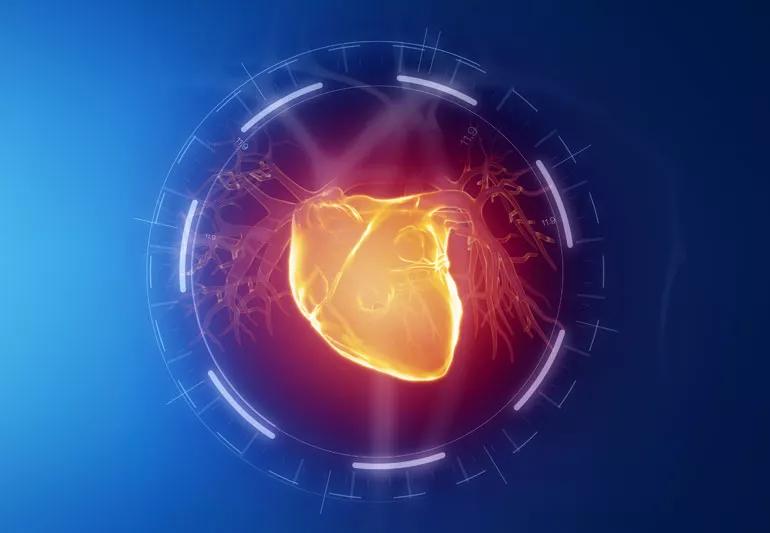An enlarged heart isn't a healthy heart

In many things, bigger is better. We’d like a bigger house, bigger paycheck or bigger biceps. But when it comes to the heart, bigger is not better. An enlarged or thickened heart — a condition doctors call left-ventricular (LV) hypertrophy — can lead to heart failure. It also may double the risk of dementia and cognitive impairment.
Advertisement
Cleveland Clinic is a non-profit academic medical center. Advertising on our site helps support our mission. We do not endorse non-Cleveland Clinic products or services. Policy
“Hypertrophy is not normal. It can be mild or it can be severe, but it definitely needs to be further investigated,” says heart failure specialist Maria Mountis, DO.
LV hypertrophy is a normal physiologic response to pressure and volume overload. Like any muscle, the heart grows bigger when it is forced to pump harder. In LV hypertrophy, the muscle fibers in the heart’s main pumping chamber enlarge and, over time, thicken.
We see it in patients with longstanding hypertension or a valve disease such as aortic stenosis or regurgitation. We also see these changes in elite athletes, for example, weightlifters and long-distance runners.
Less commonly, deposits of excess iron or a protein called amyloid cause the heart muscle to thicken.
Some people are predisposed genetically to developing hypertrophy with a condition called hypertrophic obstructive cardiomyopathy. “It’s not unusual for these patients to report having a family member who was affected by this condition or have heard that a relative died suddenly of unexplained causes,” says Dr. Mountis.
Many individuals develop heart failure, specifically heart failure with preserved ejection fraction (HFpEF, also called diastolic heart failure). Such hearts contract normally, but are too stiff to refill properly.
“The classic patient with HFpEF that I see is usually an overweight woman in her 60s, 70s or 80s, who has sleep apnea and atrial fibrillation,” says Dr. Mountis.
Advertisement
The diagnosis is easily missed because the heart looks normal when imaged on echocardiography (echo). It takes an astute cardiologist to match the symptoms with the potential diagnosis.
“We use echocardiography to measure the septum that divides the two ventricles, as well as the back wall of the heart. These are classic areas where the muscle will thicken,” says Dr. Mountis.
LV hypertrophy itself isn’t the focus of treatment: The underlying disease is addressed. This may require taking medications for atrial fibrillation or blood pressure, treating sleep apnea, following a low-salt diet and limiting fluid intake.
“Because heart failure is largely preventable, it’s up to you to take the necessary steps to keep your heart healthy,” says Dr. Mountis.
Patients with LV hypertrophy are closely monitored to ensure that heart failure doesn’t develop or worsen.
If amyloidosis is suspected, you should be seen at a specialized amyloid center like the one at Cleveland Clinic to determine the type of amyloid and exclude other reasons that LV hypertrophy may be present.
“We have new protocols for treating this disease,” says Dr. Mountis.
This article originally appeared in Cleveland Clinic Heart Advisor.
Advertisement
Learn more about our editorial process.
Advertisement

Most recommended precautions center around minimizing bruising or swelling

Even one drink can have an impact on your cognitive function leading to slurred speech, blurred vision and impaired memory

Understand who may (and may not) benefit

Lorem ipsum dolor sit amet. Et odio Quis vel ipsam omnis eum alias deleniti et placeat impedit non voluptas galisum hic autem enim et cupiditate aliquid. Est beatae quidem non facilis autem ut commodi nisi aut tempore rerum et dolores voluptatem cum enim optio id sapiente quasi. Ad laboriosam officiis 33 cupiditate sequi ea voluptatum consectetur qui necessitatibus voluptate et quasi doloremque et facere explicabo quo explicabo officia

Seeking help through therapy can be an important step in improving your quality of life when you have UC

Type 2 diabetes isn’t inevitable with these dietary changes

Applying a hot or cold compress can help with pain